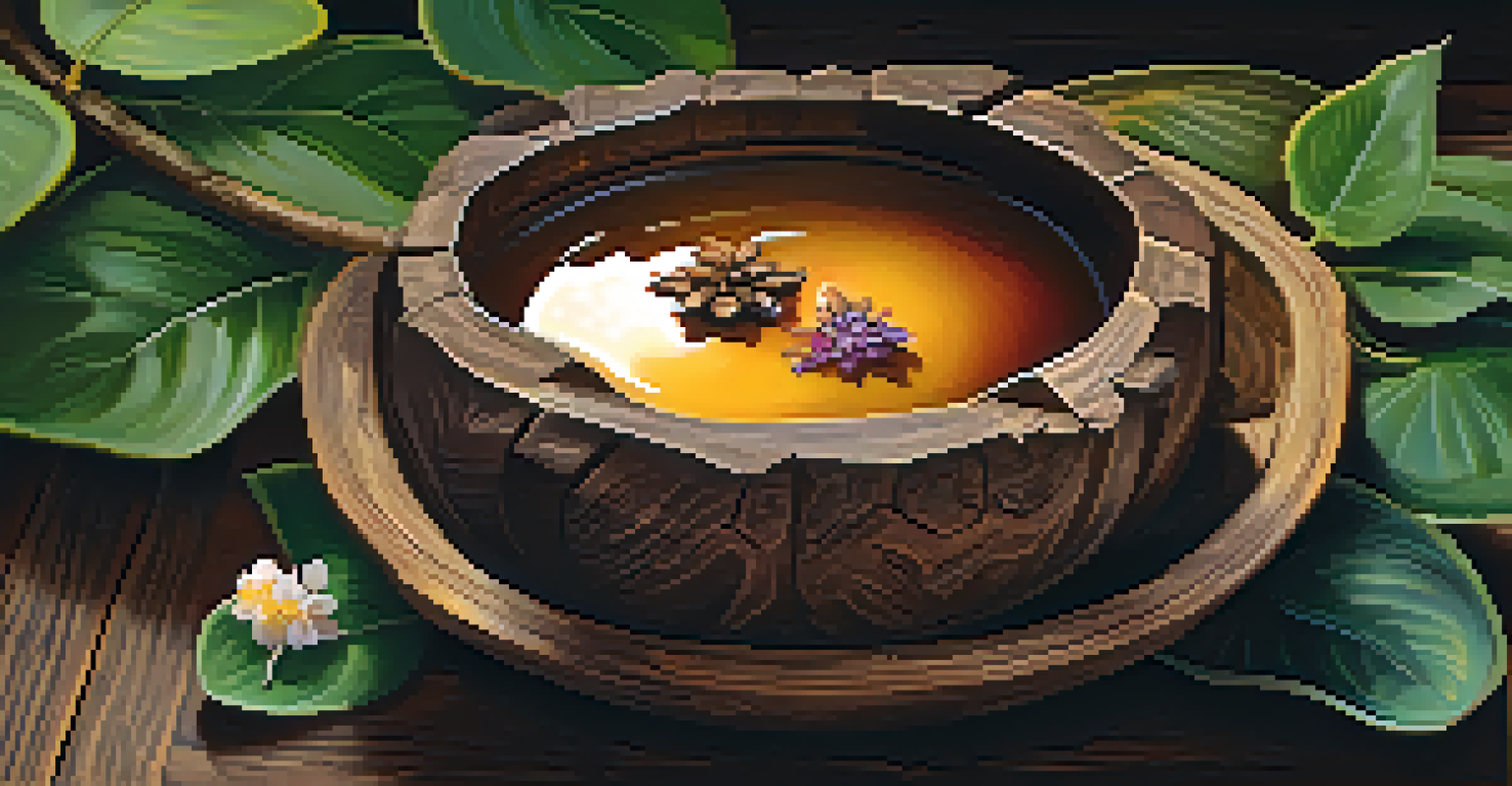The Role of Ayahuasca in Therapeutic Trauma Recovery Practices

Understanding Ayahuasca and Its Cultural Roots
Ayahuasca is a traditional Amazonian brew made from two plants: the Banisteriopsis caapi vine and the Psychotria viridis leaf. This potent combination has been used for centuries by indigenous tribes for spiritual and healing ceremonies. The brew is rich in the psychoactive compound DMT, which is believed to facilitate profound introspection and emotional release.
The greatest healing therapy is the friendship of a human being.
The cultural significance of Ayahuasca cannot be overstated; it's often used in communal rituals to promote connection, healing, and self-discovery. These ceremonies are led by experienced shamans who guide participants through their journeys, creating a safe environment for deep emotional exploration. Understanding this context is crucial for recognizing Ayahuasca's role in therapeutic practices today.
As modern psychology increasingly acknowledges the importance of emotional healing, Ayahuasca is being integrated into therapeutic trauma recovery practices. This blend of ancient wisdom and contemporary psychology offers a unique perspective on healing trauma, making it essential to explore how Ayahuasca can support individuals on their recovery journeys.
How Ayahuasca Works on the Mind and Body
When consumed, Ayahuasca induces altered states of consciousness, allowing individuals to access deep-seated emotions and memories. During these experiences, participants may confront painful memories or unresolved trauma, leading to cathartic releases. This process can be both challenging and transformative, as it often helps individuals gain clarity about their past.

Research suggests that the brew's effects on serotonin receptors may play a role in alleviating symptoms of anxiety and depression, common issues for those recovering from trauma. By promoting neuroplasticity, Ayahuasca may help individuals rewire their thought patterns, fostering healthier emotional responses. This biological aspect complements the psychological journey experienced during ceremonies.
Ayahuasca's Cultural Significance
Ayahuasca is deeply rooted in Amazonian traditions, serving as a key tool for spiritual healing and emotional exploration within communal rituals.
Participants often report a sense of connection to themselves and others during their Ayahuasca experience. This communal aspect can enhance feelings of support and understanding, which are vital for anyone on the path to recovery. The combination of individual introspection and collective healing creates a powerful environment for trauma recovery.
Potential Benefits of Ayahuasca in Trauma Recovery
Ayahuasca has been associated with numerous benefits for trauma survivors, including increased emotional resilience and improved self-awareness. Many participants find that their traumatic experiences lose their emotional charge, allowing them to process and integrate their feelings more effectively. This shift can lead to personal empowerment and a renewed sense of purpose.
Your present circumstances don't determine where you can go; they merely determine where you start.
Moreover, the brew can facilitate a deeper understanding of one's life choices and behaviors, providing valuable insights into the roots of trauma. By addressing these underlying issues, individuals can work towards healing rather than simply coping with symptoms. This holistic approach can be particularly advantageous for those who have struggled with traditional therapeutic methods.
It's important to note that Ayahuasca is not a magic cure; it requires commitment and follow-up integration work to ensure lasting benefits. Many participants find it helpful to engage in therapy or support groups following their Ayahuasca experiences, creating a comprehensive healing plan that addresses both emotional and psychological needs.
The Role of Integration Therapy After Ayahuasca
Integration therapy is a crucial component of the Ayahuasca healing process. After experiencing the brew's profound effects, individuals often need guidance to make sense of their journey and apply insights to their everyday lives. Integration therapists specialize in helping participants navigate their experiences, fostering a supportive environment for reflection and growth.
This type of therapy focuses on translating the often abstract feelings and revelations from an Ayahuasca ceremony into actionable steps. Participants may explore how their insights can affect relationships, career choices, and personal goals. This bridging of experiences is essential for ensuring that the healing process continues beyond the ceremonial context.
Benefits for Trauma Recovery
Participants often experience increased emotional resilience and self-awareness, allowing them to process trauma more effectively through Ayahuasca.
Additionally, integration therapy can help participants address any challenging emotions that arise post-ceremony. By providing tools for coping and self-care, therapists empower individuals to maintain their progress and continue healing long after their Ayahuasca experience.
Cautions and Considerations in Ayahuasca Use
While Ayahuasca can offer profound healing, it's not without risks and considerations. Individuals with certain mental health conditions, such as schizophrenia, may experience adverse effects due to the brew's psychoactive properties. It's crucial for those considering Ayahuasca to consult with healthcare professionals and ensure they are in a safe and supportive environment.
Additionally, the setting in which Ayahuasca is consumed plays a significant role in the overall experience. A supportive, well-structured ceremonial environment led by experienced shamans can make all the difference. Conversely, an unsafe or poorly facilitated setting can lead to negative experiences or trauma.
Lastly, individuals should approach Ayahuasca with respect and intentionality. Understanding its cultural roots and the significance of the rituals can enhance the experience and foster a deeper connection to the healing process. This mindfulness is essential for maximizing the potential benefits of Ayahuasca in trauma recovery.
Personal Stories of Healing Through Ayahuasca
Many individuals who have participated in Ayahuasca ceremonies share transformative stories of healing and self-discovery. For instance, one participant recounted how confronting past trauma during an Ayahuasca journey allowed her to release years of pent-up emotions, leading to newfound clarity and peace. This kind of personal narrative underscores the brew's potential in therapeutic settings.
Another individual described how Ayahuasca helped him reconnect with his inner child, enabling him to process childhood trauma in a way he had never been able to before. These personal anecdotes highlight the unique emotional journeys that Ayahuasca can facilitate, offering insights into its impact on trauma recovery.
Importance of Integration Therapy
Post-ceremony integration therapy is essential for helping individuals apply insights gained from Ayahuasca experiences to their everyday lives.
These stories serve as powerful reminders of the resilience of the human spirit. They illustrate the diverse ways in which Ayahuasca can support healing, reaffirming its role as a valuable tool in the ongoing conversation about trauma recovery and mental wellness.
The Future of Ayahuasca in Therapeutic Practices
As interest in alternative healing modalities continues to grow, Ayahuasca is carving out a place in the wider therapeutic landscape. Researchers and practitioners are increasingly exploring its potential benefits and integrating it with traditional psychological approaches. This convergence of ancient practices and modern science holds promise for enhancing trauma recovery outcomes.
Moreover, as more individuals share their positive experiences with Ayahuasca, there is a growing recognition of its value in mental health care. This shift in perception may lead to more structured and regulated environments for Ayahuasca use, ensuring that individuals receive the support they need for safe and effective healing.

Ultimately, the future of Ayahuasca in therapeutic practices will depend on continued research, ethical considerations, and respect for its cultural origins. By fostering a dialogue that emphasizes safety, education, and integration, we can ensure that Ayahuasca remains a meaningful and impactful tool for those on their healing journeys.